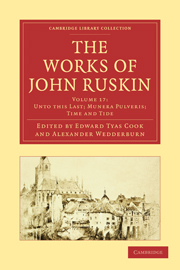Book contents
- Frontmatter
- Contents
- LIST OF ILLUSTRATIONS
- INTRODUCTION TO THIS VOLUME
- PART I “UNTO THIS LAST” (1860)
- PART II “MUNERA PULVERIS” (1862, 1863)
- PART III “TIME AND TIDE, BY WEARE AND TYNE” (1867)
- APPENDIX: LETTERS AND PAPERS ON ECONOMIC SUBJECTS 1863–1873
- I LETTERS ON “MUNERA PULVERIS” (1863, 1875, 1877)
- II THE DEPRECIATION OF GOLD (1863)
- III LETTERS ON THE LAW OF SUPPLY AND DEMAND (1864, 1873)
- IV LETTERS ON WORK AND WAGES TO THE “PALL MALL GAZETTE” (1865)
- V LETTERS ON SERVANTS AND HOUSES TO THE “DAILY TELEGRAPH” (1865)
- VI LETTERS ON RAILWAYS AND THE STATE (1865, 1868, 1870)
- VII SPEECHES ON TRADES UNIONS AND STRIKES (1868)
- VIII EMPLOYMENT FOR THE DESTITUTE POOR AND CRIMINAL CLASSES (1868)
- IX LETTERS ON ROMAN INUNDATIONS (1871)
- X LETTERS ON “HOW THE RICH SPEND THEIR MONEY”(1873)
- XI HOME, AND ITS ECONOMIES (“CONTEMPORARY REVIEW,” MAY 1873)
- Plate section
III - LETTERS ON THE LAW OF SUPPLY AND DEMAND (1864, 1873)
Published online by Cambridge University Press: 05 November 2011
- Frontmatter
- Contents
- LIST OF ILLUSTRATIONS
- INTRODUCTION TO THIS VOLUME
- PART I “UNTO THIS LAST” (1860)
- PART II “MUNERA PULVERIS” (1862, 1863)
- PART III “TIME AND TIDE, BY WEARE AND TYNE” (1867)
- APPENDIX: LETTERS AND PAPERS ON ECONOMIC SUBJECTS 1863–1873
- I LETTERS ON “MUNERA PULVERIS” (1863, 1875, 1877)
- II THE DEPRECIATION OF GOLD (1863)
- III LETTERS ON THE LAW OF SUPPLY AND DEMAND (1864, 1873)
- IV LETTERS ON WORK AND WAGES TO THE “PALL MALL GAZETTE” (1865)
- V LETTERS ON SERVANTS AND HOUSES TO THE “DAILY TELEGRAPH” (1865)
- VI LETTERS ON RAILWAYS AND THE STATE (1865, 1868, 1870)
- VII SPEECHES ON TRADES UNIONS AND STRIKES (1868)
- VIII EMPLOYMENT FOR THE DESTITUTE POOR AND CRIMINAL CLASSES (1868)
- IX LETTERS ON ROMAN INUNDATIONS (1871)
- X LETTERS ON “HOW THE RICH SPEND THEIR MONEY”(1873)
- XI HOME, AND ITS ECONOMIES (“CONTEMPORARY REVIEW,” MAY 1873)
- Plate section
Summary
To the Editor of the “Daily Telegraph”
Sir,—In your valuable article of to-day on the strike of the colliers, while you lay down the true and just law respecting all such combinations, you take your stand, in the outset, on a maxim of political economy, which, however trite, stands yet—if I am not deceived—in need of much examination and qualification. “Labour” you say, like every other vendible commodity, “depends for its value on the relation of supply to demand” But, Sir, might it not be asked by any simple and practical person, who had heard this assertion for the first time—as I hope all practical persons will some day hear it for the last time—” Yes; but what does demand depend upon, and what does supply depend upon?” If, for instance, all deathbeds came to resemble that so forcibly depicted in your next following article, and, in consequence, the demand for gin were unlimitedly increased towards the close of human life, would this demand necessitate, or indicate, a relative increase in the “value” of gin as a necessary article of national wealth, and liquid foundation of national prosperity? Or might we not advisably make some steady and generally understood distinction between the terms “value” and “price” and determine at once whether there be, or be not, such a thing as intrinsic “value” or goodness in some things, and as intrinsic unvalue or badness in other things; and as value extrinsic, or according to use, in all things?
- Type
- Chapter
- Information
- The Works of John Ruskin , pp. 499 - 505Publisher: Cambridge University PressPrint publication year: 2010First published in: 1905

